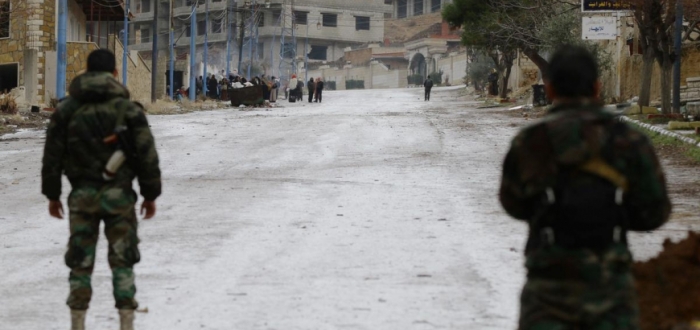Daraya, at the southern entrance to Damascus, is a city that has faced siege by regime forces like many others in Syria. But what distinguishes Daraya is that it receives no aid, with the regime denying any food, medicine, or even baby milk to enter the area.
Daraya possesses a special symbolism for the Syrian opposition, as it was at the forefront of the anti-government protests against Bashar al-Assad’s regime in March 2011. It has been under siege since 2012, and outside regime control for the past four years.
Bissan Fakih, spokeswoman for The Syria Campaign, said that in Daraya, "The regime is using its 'submit or starve' policy to try and take back the town. Daraya is on the capital's doorstep, so the regime won't give it up."
No form of humanitarian aid has entered Daraya since the imposition of the siege, even though international organizations have managed to deliver aid recently to several blockaded cities after the government capitulated under pressure from the international community.
After a long wait, the people of Daraya thought that on May 12 they would receive their first batch of aid. After obtaining permission from the concerned parties, an international convoy loaded with medicine and baby milk arrived at the entrance to the city. But it was turned back without unloading its cargo at the last regime checkpoint.
Daraya is south of Damascus and the road connecting it with the center of the capital takes no more than 15 minutes by car. It is also adjacent to the Mezzeh military airport, where the infamous Mezzeh prison and Airport Intelligence center are located.
A source close to the government told the Agence France-Presse: “Daraya has a special place in the government's mind.” He added: "The state wants to take Daraya — it doesn't want a truce there. The location is too strategic."
Shadi Matar, an activist in Daraya, said that in November 2012 regime forces began setting up checkpoints at the city’s entrance, and that, "By December, there were no safe ways to come into or leave Daraya."
Before the revolution, about 80,000 people lived in Daraya, but the number has decreased by about 90 percent. Those residents who remain face severe shortages of supplies and suffer from malnutrition.
Hosam Khshini, a doctor in one of Daraya's clinics, said residents would eat wild grass if it was available.
"Electricity? We don't even know what that is anymore. Water? It's all from the wells and it's not potable anyway. Food and milk for children — none."
This article was translated and edited by The Syrian Observer. Responsibility for the information and views set out in this article lies entirely with the author.


